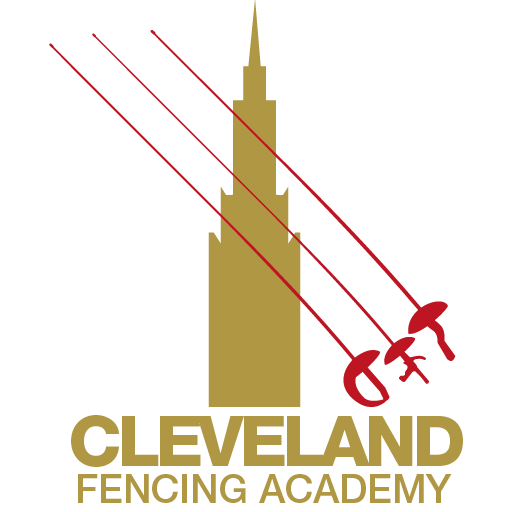For Kids
Why fencing at Cleveland Fencing Academy? The elite art of fencing improves both body and mind like no other sport. It is considered the fastest sport on the planet and requires training the eye, brain, memory, and body to act in harmony to produce results. Fencing is generally accepted as a martial art and sources its roots in the history of European culture: the various weapons of fencing harken back to such storied events ranging from Cossack saber raids to Medieval duels.
The most direct health benefit of fencing is the exercise component of the sport. Each fencing session is a full-body workout and challenges muscles ranging from those in the feet and lower legs all the way up to the neck, shoulders and arms. Fencing places a number of physical fitness demands on its participants. The sport develops fitness, agility, speed, strength, coordination, balance and timing. Physical ability is just as important as having a strong mental edge. It involves the analysis of strategy, tactics and psychological control, as well as mental awareness, coordination, strength, balance, dexterity and aerobic fitness. The amazing tactical complexity of modern fencing has earned the sport of fencing the nickname “Physical Chess with speed of light”. Fencing demands actions as fast as boxing, it is as physically demanding as basketball, as mentally challenging as chess, and requires muscle memory training like kung fu.
Lessons from fencing can be extended to business, school activities, training schedules for other extra-curriculars, and it is plain old fun!
Fencing helps children learn to pay attention and to develop their decision-making abilities.
Because fencing is an individual sport, the fencer is responsible for his/her success or failure and can see a direct correlation between his/her efforts and achievements. Whereas in team sports you can still lose even if you play outstandingly, in fencing your overall performance is tied to your personal efforts which teaching the essential lessons of responsibility and self-discipline
Usually kids who fence achieve better academic results than their peers.
Fencing can be enjoyed recreationally and/or competitively.
Because of the “fight or flight” aspect of the sport, generally fencers from the same club are very close with each other, become business partners, and lifelong friends because they have all chosen “to fight”!
Fencing is a small community and you get to know fencers from other cities, states and countries as you become more and more competitive. Fantastic horizon-expander for kids ages 6 and up. Competitive fencing generally only begins at 10 or 12 years of age, so it is never too late to start! There are adult and senior competitions etc.
Great for the “lone wolf” personality, or team player type who wants to be a part of the club team and cheer on their friends
Kids of all body types can fence. Since fencing has both mental and physical aspects, no one body type has a predetermined advantage
Unique opportunity in the Cleveland area to take advantage of an Academy who can produce champions. Dollar for dollar few other local opportunities can provide you and your kids what CFA can! Our coaches are highly successful and have very colorful backgrounds to match!
Fencing is a great way to get into college for free. Many great colleges have fencing teams (especially women’s) and are always looking for experienced fencers. A full spectrum of opportunities exist to fence beyond CFA: colleges ranging from in-state to the Ivies offer scholarships and a guaranteed number of spots in each incoming class to fencers. Having fencing on your college resume provides you with another way for your child to market themselves.
And last but not least! Fencing is a perfect Covid-19 sport: you are in masks, gloves, layers of protective clothing, and if anybody gets closer than 6 feet to you – you stab them!
Sign your children up for the Cleveland Fencing Academy beginner program and help them get plugged into the oldest modern Olympic sport, realize their Star Wars Jedi dreams, and become competitive on a regional /national/international level with 2-4-6 years of training!

